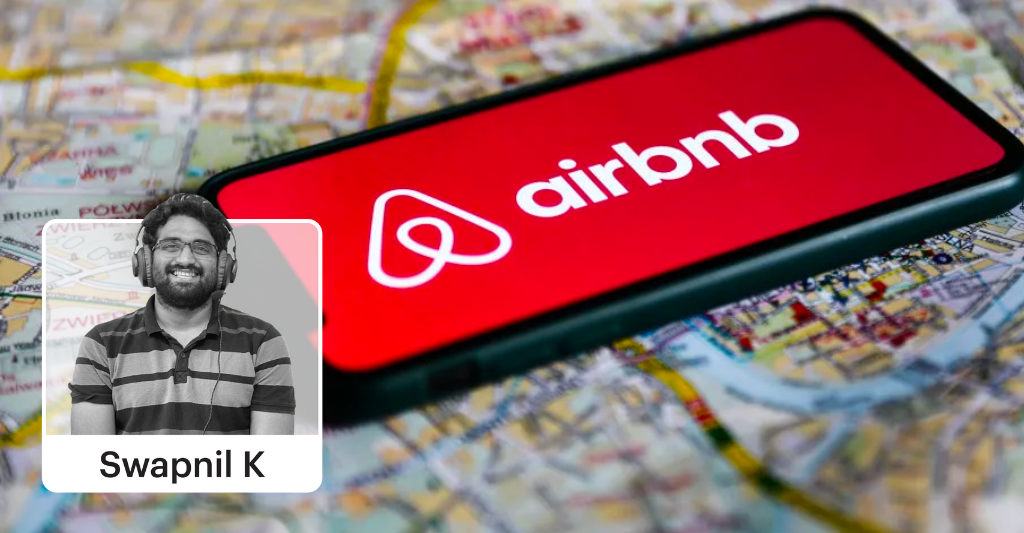Last Updated on Oct 10, 2023 by Anjali Chourasiya
“We need to get our house in order“, said Airbnb CEO Brian Chesky.
It is not the vacation house he is talking about. It is the broken business model of Airbnb itself. Brian opens up on issues within Airbnb during his interview with Bloomberg.
So what’s broken?
Table of Contents
The dynamics of demand and supply
There are many issues, but let us start with the basics – the price! Travellers want affordable prices, but the owners want to charge higher. Economics 101 tells us demand and supply will determine the price. The same logic applies here. Every location has its price, and according to the facilities, the prices differ. But it is not as simple as it sounds. Let’s take a look.
Brian says, “The more affordable Airbnbs are, the more bookings we get.” This is nothing but a simple demand-supply equation. The lower the price, the higher the demand and higher demand translates into higher revenue for the company, where it struggles today. Brian believes that the owners should sacrifice some of their margins and make prices competitive.
Cheaper vs competitive
Brian highlights that in the last year, hotel prices went up by 10%, but Airbnb rentals declined by 1%. This can be confusing because, on one hand, he wanted prices to go down, but he didn’t want them to fall. Here, we must understand the difference between making property prices cheaper versus competitive.
The business of short-term property rentals is in direct competition with the hotels. Airbnb became famous because of lower rentals and better experiences compared to hotels. But that has changed over time. A lot of properties listed on the platform are not up to the mark. Sometimes they don’t even exist. These issues have led to a rift; thus, good and genuine properties attract premiums.
He wants hosts to give better deals and experiences to customers as that can boost their as well as companies’ earnings. But how would the owners offer competitive prices? Here comes an economic problem with a decent solution.
Bridging the information gap
To offer the best prices, hosts must know about the market. A management grad will call it ‘market research’. But how will an Airbnb host gain this information with a limited area of expertise and time? Airbnb (i.e. an intermediary) has the information of all the rental properties in a locality. The hosts (i.e. sellers) don’t. This is a case of, as economists like to call it, information asymmetry – a situation where one party has the information about the product while the other party doesn’t.
Since Brian wants hosts to offer competitive prices, the platform’s prerogative is to help hosts arrive at such prices, as it might become a win-win deal. He has the solution – to provide analytics for that area. However, the data will not contain the prices of hotels. So, this is an incomplete solution. At the same time, he is trying to weed out numerous problems like fake listings.
But these are internal problems. Probably manageable and controllable. But what about the external problem, i.e. government?
Regulatory hurdles: The case of New York City
New York City tightened the rules on short-term rentals. There are five requirements for renting out the property:
- The owners must be present in the home during the rental period.
- More than two guests are not allowed, irrespective of the size of the house.
- The doors inside the houses cannot be locked, giving guests complete access to the house.
- The property cannot be rent-controlled.
- It must be registered to accept reservations.
If anyone wants to register, then the speed of granting permits is also slow.
Take a moment to think about these rules, and you will see that Airbnb cannot function in the city as it has.
The economic impact
First, let us understand why the city needed these rules.
General housing and rental prices increase due to platforms like Airbnb. In cities like New York, which is bigger and also attracts tourists, students, and business people, there is a constant need for places to stay. Homestays work cheaper for them, and subletting gives homeowners another stream of income. Let’s see why this can become a big problem.
Assume a city has 1,000 properties – 800 housing and 200 hotel rooms. Out of 800, 100 properties were listed on a platform like Airbnb. 50 property owners sublet a room in their house on the platform. That means the housing stock is reduced to 675 (800-100-50/2) while paid accommodations are increased to 325 (200 hotels + 100 + 50/2). So, the net effect is a reduction in the supply of housing units and an increase in the supply of rented units.
When the supply of housing units goes down, the rents and property prices should go up. That has been observed in many cities, including New York and Barcelona. On the other hand, due to subletting, the supply of commercial units has gone up, and that should bring the nightly rates down. Airbnbs are usually cheaper than hotels; thus, many crowd shifts from hotels to homestays. Also, homestays come with a kitchen, giving them an edge over hotels.
As explained above, such shifts in housing patterns affect the local economy. If the number of tourists increases, which it did post-COVID, the demand for accommodation also increases. That pushes the hotel and homestay rates upwards. The economic principles imply that when the price increases, the seller is incentivised to increase the supply to earn higher profits. That means more people become active in subletting their homes or rooms on a platform like Airbnb to get more money. Going by our example above, it would mean housing stock will now be at 600 units while the rented ones at 400 units.
This would mean an upsurge in general housing rents and prices and can cause a severe housing crisis where locals and workers cannot afford to live in the city while tourists flock in and out every two days. After COVID-19, over-tourism or revenge tourism has increased rents across many such tourist-cum-urban hotspots and crowded out locals who seek affordability in their daily lives.
Ideally, if we go by the theory, the supply and demand will intersect at some point, and the price will stabilise. However, practising it would mean experimenting with lives and livelihoods. That is crazy and unsustainable.
The challenge of an increase in the housing supply
Another theoretical solution is to increase the housing supply. That would mean constructing more houses and accommodating locals, workers, students, and tourists all at once. There is a big BUT in such type of solution. Everyone, including the government and businesses, would have been super happy if that happened. But in reality, things don’t work in that way.
Building houses or hotels take time. Land, labour, material and capital should all be available to make it happen. Considering the inflationary pressures, capital has become expensive in the US, the tight labour markets have raised wages and salaries, and higher commodity prices have made building materials costly. These are too big problems for a city government to handle and cope with. Also, when angry citizens start complaining about inflation to local politicians, there is no time to solve structural problems. Therefore, comes a diktat to improve housing supply by restricting short-term rentals via platforms like Airbnb.
Outcomes for Airbnb and prospects ahead
Nobody knows if this new rule will ease the housing crisis or not. But that has a direct impact on Airbnb’s top line. Around 17,000 listings have gone from Airbnb’s listings in New York between June 2023 and September 2023. Some are still renting their homes illegally or by different modes. It has led to a dip in the incomes of homeowners who are struggling to make ends meet. It has also resulted in higher Airbnb rentals in the outskirts of New York. These are visible impacts of the new rule.
There will be more bureaucracy and lobbying in New York for sure. But this can become a precedent in other areas where over-tourism has impacted local economies negatively.
However, KeyBanc Capital Markets analyst Justin Patterson has downgraded Airbnb stock as travel trends are expected to fade in the next year.
Overtourism in New York estimated lower tourism elsewhere, and return-to-office policies might have negative impacts on Airbnb’s revenues, anyway. But Brian has some plans. One of them is long-term rentals instead of short-term. Only time will tell whether his plans materialise.
Airbnb’s influence in India
On the other side of the globe, in India, a report by Oxford Research stated that Airbnb contributed $108 mn to the gross domestic product of Goa and supported over 11,500 local jobs in 2022 alone. It is one of the major driving factors of tourism-led development in the state.
Well, we can all agree that we need short-term rental service providers like Airbnb to survive. But neither at the cost of affordable housing nor over tourism.
- Senior Citizens To Get Health Insurance? Facts Explained! - Apr 30, 2024
- How Stock Markets React to Interim Budgets: Cues From the History - Jan 31, 2024
- Top 5 Indian Economics Newsletters to Subscribe in 2024 - Dec 6, 2023



